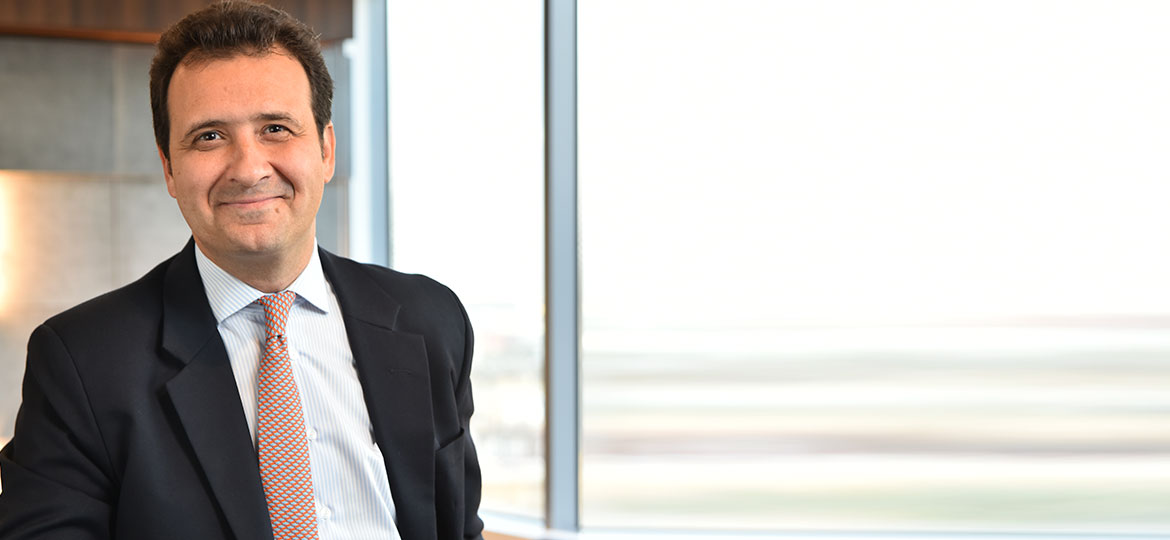
JOSE IGNACIO DE LA FUENTE, Managing Director OF Ridgewood
Celebrating one year of JV success
In October 2020, Almar Water Solutions, Abdul Latif Jameel Energy’s dedicated water solutions unit, and HA Utilities BV (HAU), part of Hassan Allam Holding (HAH), finalized a deal with the Ridgewood Group, taking ownership of a portfolio of water assets located across Egypt.
The deal was closed under the joint venture between Almar Water Solutions and HA Utilities BV, announced in 2019, and created to provide sustainable water infrastructure solutions to small-to-medium sized clients across Egypt. To mark the one-year anniversary of the landmark deal, we spoke to Jose Ignacio de la Fuente, Managing Director Ridgewood at Almar Water Solutions, about progress over the last 12 months and his plans for the future.
Q. Why was Almar Water Solutions keen to establish a presence in Egypt?
Almar Water Solutions already had a presence in the Middle East through our developments at Shuqaiq 3 in Saudi Arabia and Muharraq in Bahrain. We wanted to build on this foundation to grow our operations in the region.
We saw great potential in Egypt, as there is a big gap between water demand and supply, and the government was looking to private sector providers to help fill this gap. We identified Ridgewood as a very solid company with a strong position in the market, around 60% to 70% market share in some regions of the country, and good potential for further growth.
It was a good entry point for us in partnership with Hassan Allam Utilities.
Q. Did those expectations prove to be correct?
Yes, 2021 is proving that acquiring Ridgewood Group was the right decision. We are finding most of our expectations fulfilled in terms of growth, in terms of profitability, in terms of added value to clients, with a strong local team in place that is committed to the phase of expansion that the company is going through. So, yes, it was definitely the right choice.
Q. What is the market focus for Ridgewood?
The core business of Ridgewood is the leisure and hospitality sector. The majority of our clients at the moment are hotels, which is a seasonal industry. Hence our strategy to diversify into other less seasonal sectors, like industrial customers and real estate developers. This will allow us to offer a combined value proposition of, say, a desalination plant and a sewage treatment plant. We have been working throughout 2021 to build up a very strong value proposition for an integrated water cycle approach with industrial clients that is now ready to launch.
Some industrial transactions are currently at a well advanced stage, and we will be seeing more deals in 2022.
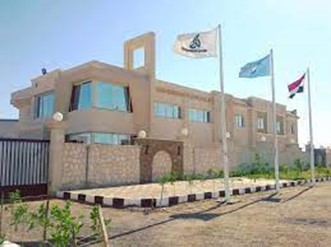
Q. Why did you decide on a joint venture approach, rather than an outright acquisition or setting up a new Almar operation in Egypt from scratch?
When you are starting a new venture in a new country, it’s very useful to have a partner you can rely on, to help overcome the many challenges that operating in a new jurisdiction brings with it. We decided a joint venture was the best approach for us.
Our JV partner, Hassan Allam Utilities, has excellent experience in and knowledge of the Egyptian market. Two years ago, we joined forces in a joint venture to target the municipal-scale market.
So, we knew them well and were confident they would also make a good partner for the small-to-medium-sized end of the market, too.
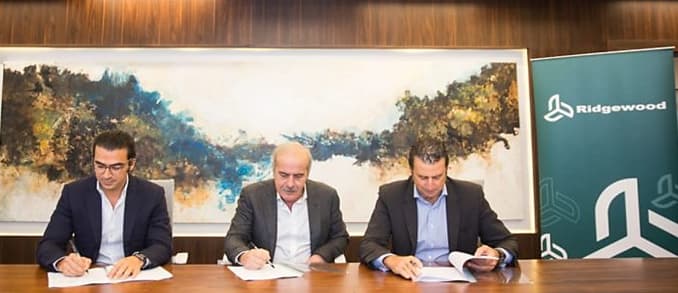
Pictured (L-R) Amr Allam, Co-CEO Hassan Allam Holding, Zaki Girges, former Chairman and shareholder Ridgewood Water Desalination, and Carlos Cosín, CEO of Almar Water Solutions and the signing ceremony for the acquisition of Ridgewood
Q. Ridgewood already had 58 water assets in Egypt. What changes, if any, have you made in the past year?
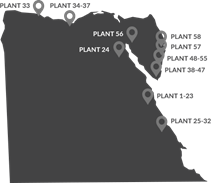
The actual water capacity of Ridgewood now is 73,000 cubic meters a day. Over the past year, let’s say our ‘transition year’, we took the opportunity to update some of the plants and renew some critical equipment in order to increase the availability of the plants. Availability is key in this business, because with the same asset you can produce and sell more or less water depending on how well maintained and operated the asset is. We are already seeing the payback of this investment as the tourist sector is now showing signs of recovery and our clients, especially in the Red Sea coast area, are starting to request larger volumes of water.
We are in expansive mode. There’s a lot of capacity to invest and to grow, and a lot of support from the stakeholders, too. Both Hassan Allam Utilities and Almar Water Solutions are very much involved in making sure things go to plan and are running smoothly.
Q. Can you explain why a customer like a hotel or an industrial facility needs to contract a private provider like Ridgewood to supply its water?
In the Egyptian market, as in many markets with low to no rain precipitation around the world, there are two sources of water. One is piped water from the municipality, but this is a limited resource that has to be shared with the local population in cities and municipalities. It may not even be available in certain locations, or the distribution network may not have enough capacity to service the hotel or industrial plant.
The second source of water is desalinated water supplied by a privately-owned water provider like Ridgewood. A development like a hotel or a high-end real estate development uses significant volumes of water. There’s guest use, swimming pools, landscaping, golf courses and so on.
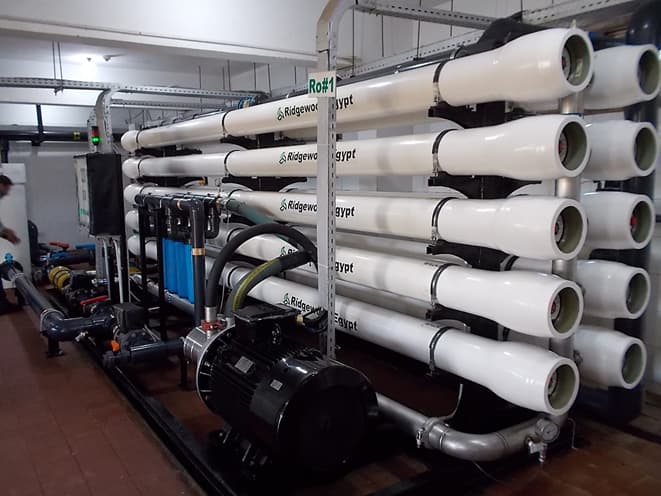
Depending on the level of salinity in the feed water, we can talk of two sources where we apply the same technology of Reverse Osmosis (RO): brackish desalination or seawater desalination. It is usually hard to obtain from governments and local administrations a license to extract water from the sea, what we call ‘open intake’. So, most of our plants extract water from saltwater wells that are usually located 200-400 meters inland. Sometimes the well even has a degree of natural filtration, which aids the desalination process.
Q. How does the water get from the plant to the customer?
There are two models. One is to have a medium to large central desalination plant, like the ones we have at Hurghada and Sharm El-Sheikh, from where the water is piped or distributed by truck to the client’s facilities.
The second model is to have smaller, local plants that directly supply two or three clients in the same area.
Q. Given that a significant proportion of your clients are in the leisure and hospitality industry, which was hit very hard by the COVID-19 pandemic, it must have been a very challenging year to enter into the market?
The first quarter was slow until about March 2021, not only because of the pandemic but also because it is the seasonality effect with hotels. We focused on optimization and producing as much water as we could as efficiently as possible. A material level of investment was deployed in upgrading of the plants and to be ready for the high season in the North Coast and Red Sea areas.
By Q2 the situation was already starting to improve. Tourists were starting to come back. We still didn’t have many direct flights from important markets for the Egyptian tourism sector like Russia, Ukraine, Germany, or Switzerland, but we could start seeing better figures in terms of sales.
It was in Q3 that we saw a real difference, enabling us to keep the main KPIs we follow up on a weekly basis within budget in terms of volume and sales, and this continued in Q4. We are not at full pre-COVID levels yet, but we can see that clients are busier. Hotels are permitted to operate at almost full capacity again and demand is steadily increasing. We’re meeting budget with the indicators that we look at on a weekly basis and we hope to end the year aligned with our business plan.
We also have a growing pipeline of operations and maintenance (O&M) contracts, where the client owns the asset, but we are contracted to manage and maintain it. We are booking more than new 8,000 cubic meters a day of new capacity in standalone O&M contracts, and we expect that to continue in 2022.
Q. That should put you in a strong position for 2022?
Exactly. It’s what we’ve been planning for. We’ve invested strategically and we’ve got a good pipeline of secure clients for the first quarter of 2022. We are a vertically integrated business. We book the contract, we do the engineering, the procurement, the fabrication, the installation of the skid mounted solutions and deliver the associated infrastructure by connecting to the feed wells and disposing of the brine.
This gives us very strong control of the process from start to finish, but it also means you have to invest heavily upfront. You need to generate enough cash from your existing collections to finance the new assets that you will be building. And that’s what we’re focusing on.
We are currently building five new projects that will be commissioned in December 2021 and January, February and March 2022. We will be fabricating, delivering the units to site, performing the connections, energizing the units, testing and commissioning the plants to be operational on the contractual date. These units will add to our existing capacity an additional 5,000 to 6,000 cubic meters per day by the end of Q1 2022.
Q. When you look back over the past year since the acquisition of Ridgewood Group, what are you most proud of?
I’m very proud of the team and of what we’ve achieved, including our stakeholders, particularly given the challenges we faced during the tough first and second quarters. This allowed us to keep on track with our main indicators, especially in terms of optimizing operational efficiency and minimizing costs as much as possible. From day one, we could see the improvements and the commitment of the team to maintaining the durability and performance of the plants. The 400 people in Ridgewood are our most important asset, ahead of any physical asset.
Q. What are your plans for 2022?
 We expect to see a considerable level of organic growth next year in line with the global recovery of the tourism sector and the good level of response coming from the industrial market. We are not there yet, but we can see that the market is gaining traction.
We expect to see a considerable level of organic growth next year in line with the global recovery of the tourism sector and the good level of response coming from the industrial market. We are not there yet, but we can see that the market is gaining traction.
New players are coming in, but I’m confident with our continued investment plans and client diversification approach we can maintain our market position and our level of profitability despite the increasing competition.
It is an exciting time to be in this market. We are seeing more opportunities day by day and we look forward to supplying more and more clients with a reliable source of potable and industrial grade water throughout the coming years.

